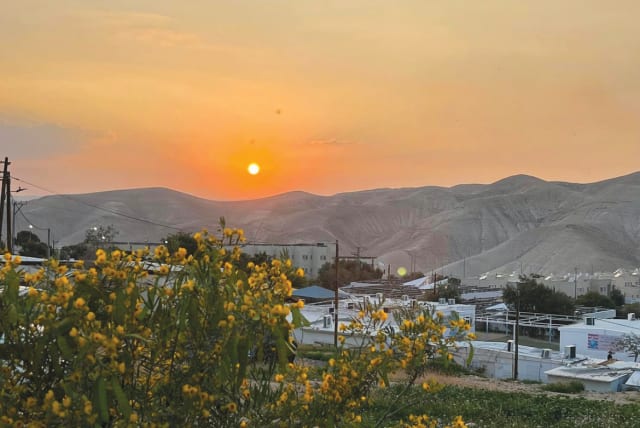Israel must continue to build to thrive, whether in hi-tech, classrooms, or cities - opinion

When Israel makes announcements about new building projects, they aren’t just headlines that draw world attention, they are a sign of Israeli growth.
Israel’s future has been compared many times to an escalator. It is either moving up or down, but it’s never stagnant and still.
For Israel to be successful it must always look to grow. Israel can never rest on its laurels, assuming inertia will guarantee its continued growth. Many Israelis enjoy their small and quiet towns and would like them to remain forever quaint. Yet they know that the land of Israel was made to grow and welcome the Jewish people from around the world. They set aside their personal desires for small-town living for the benefit of the nation and enthusiastically push for more growth.
Playing a small role in Israel’s development has been the greatest privilege of my life. I was born and raised in America, brought up by parents who made sure our home was infused with Zionism and support for the State of Israel. I was raised among the first generation of Jews to be born with an existing State of Israel, devoid of first-hand experience of Jewish existence without a Jewish State.
Like many in my generation, I take the existence of the State of Israel for granted. Raising my own children in the land of Israel, I have given them the same mindset. Like me, they have never experienced life without the State of Israel.
My paternal grandfather was born in Lithuania in 1904 and immigrated to Canada in 1930. He studied and spoke biblical Hebrew to my father. He instilled in my father a love of Zionism and of the land of Israel. My mother was also raised in a Zionist home. Her parents supported Israeli causes and had such an influence on her that she would only agree to marry my father if he promised they’d move to Israel.
My siblings and I grew up in a Zionist home with shirei am (folk songs) being sung to us as children. My twin older sisters moved to Israel at the start of their adult lives, and four out of five of us live in Israel. My father, of blessed memory, who just recently passed away, fulfilled his promise to my mother, and upon retiring they moved to Israel 20 years ago.
I live with my children and husband in a small town 20 minutes northeast of Jerusalem called Mitzpe Yericho. A few years ago, I was asked to run for the city council. I hoped to help our town grow and straighten out some of the town’s finances. In a strange series of events, the head of the city council left his role and I become the chairwoman of the city council. In Hebrew, this position is called the yoshevet rosh (“she who sits at the head”) and for lack of a better English term, I’ve essentially become known as the “mayor” of Mitzpe Yericho.
This position is unpaid but affords me the opportunity to participate in the Zionist project our ancestors could only fantasize about in prayer and late-night conversations. I have the privilege of spending countless hours planning and putting into action plans to settle the land of Israel.
God commanded the Jewish people, “You shall take possession of the land and settle in it, for I have assigned the land to you to possess.”
Since our family moved to Mitzpe Yericho, we’ve seen over 100 houses and apartments constructed, new roads have been opened, a city pool built and opened, and a sports complex has been built and should open by the start of fall. Tens of families have moved in, and the schools are full. I feel proud that I’ve been able to encourage the development of our town.
More ambitious goals
Our town has even more ambitious goals for growth over the next decade. We should see the opening of businesses and of hundreds of more homes; and with them, hundreds of new families should make Mitzpe Yericho their home. Development is the key to a successful town, regional council, and country. Mitzpe Yericho might be a small town of only five thousand people today, but its growth is a bellwether of the State of Israel’s growth.
Israel is plagued by a housing shortage and rising housing costs. Building more homes is the easiest way to bring the supply of homes up, and the costs of new homes down. Mitzpe Yericho’s plans to grow aggressively over the next decade will play a modest role in helping that process along for the good of the entire country.
Growth in Israel isn’t just important as a means to bring housing costs down. There is a well-known contrast in modern Hebrew, rosh gadol and rosh katan. Literally translated as a “big head” and “small head,” these terms signify two different attitudes, rosh gadol is the attitude of the person always looking to do more, and rosh katan is the person always looking to do less. Their attitudes express themselves in their family, professional, and communal life. A nation with a rosh gadol mentality doesn’t try to limit growth and development, it always looks for more opportunities to build.
For Israel to continue to thrive, it must continue to build. Whether in the hi-tech arena, the classrooms, or the cities and towns spread throughout the land, Israel must have a rosh gadol mentality that encourages growth. Stagnation, standing still on the escalator, is never a healthy circumstance for a country.
Not only does Israel have to shield itself from external pressures that demand a cessation of building, but it must also stave off internal pressures as well. The early Zionist pioneers, our beloved halutzim (pioneers), worked day and night to build this land, we must continue their efforts.
When Israel makes announcements about new building projects, they aren’t just headlines that draw world attention, they are a sign of Israeli growth. While these announcements might draw criticism, Israel should pay them no heed. Israel is used to people not being sympathetic to its aspirations. It has pushed past criticism in the past and thrived, and it must continue to do so in the future.
The writer is a certified interfaith hospice chaplain in Jerusalem and the mayor of Mitzpe Yericho, Israel. She lives with her husband and six children.
Jerusalem Post Store
`; document.getElementById("linkPremium").innerHTML = cont; var divWithLink = document.getElementById("premium-link"); if (divWithLink !== null && divWithLink !== 'undefined') { divWithLink.style.border = "solid 1px #cb0f3e"; divWithLink.style.textAlign = "center"; divWithLink.style.marginBottom = "15px"; divWithLink.style.marginTop = "15px"; divWithLink.style.width = "100%"; divWithLink.style.backgroundColor = "#122952"; divWithLink.style.color = "#ffffff"; divWithLink.style.lineHeight = "1.5"; } } (function (v, i) { });

